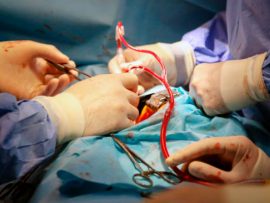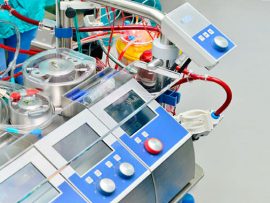Abstract Background Up to 42% of patients develop acute kidney injury (AKI) after cardiac surgery. The aim of this study was to describe the relationship between preoperative microcirculatory function and..
Read MoreAbstract OBJECTIVES: Cardiac surgery-associated acute kidney injury (CS-AKI) is associated with adverse outcomes. Single-center studies suggest that the prevalence of CS-AKI is high after the Norwood procedure, or stage 1..
Read MoreAbstract Cardiopulmonary bypass (CPB) is a common technique in cardiac surgery but is associated with acute kidney injury (AKI), which carries considerable morbidity and mortality. In this review, we explore..
Read MoreAbstract Introduction Transfusion may increase the risk of organ failure through immunomodulatory effects. The primary objective of this study was to assess for patient or transfusion-related factors that are independently..
Read MoreAbstract Background Cardiac surgery–associated (AKI) is associated with increased postoperative morbidity and mortality. Evidence suggests an association between perioperative administration and decreased incidence of postoperative AKI in cardiac surgery patients; however, an effect..
Read MoreAbstract Introduction: Intraoperative ultrafiltration (UF) is a procedure used during cardiopulmonary bypass (CPB) to reduce haemodilution and prevent excessive blood transfusion. However, the effect of UF volume on acute kidney injury..
Read MoreExploring CPB Physiology & IABP Applications: Essential Insights for Perfusionists Mastering Z-BUF in Hyperkalemia. My Near Misses. Integration of the PrismaFlex CRRT machine into your CMO circuit ..
Read MoreAbstract BACKGROUND: Acute kidney injury (AKI) is a common complication after cardiac surgery and is associated with increased morbidity and mortality. However, no specific treatment options are available, emphasizing the..
Read MoreAbstract Acute kidney injury (AKI) after cardiac surgery is a common complication that can lead to death. We previously reported that the creatinine reduction ratio (CRR) serves as a useful..
Read MoreAbstract Background: Acute kidney injury (AKI) is a common and serious complication after the repair of Type A acute aortic dissection (TA-AAD). However, previous models have failed to account for the..
Read MoreAbstract Background: Early detection of acute kidney injury (AKI) is crucial for timely intervention and improved patient outcomes after cardiac surgery. This study aimed to evaluate the potential of urinary..
Read MoreAbstract Background As patients with acute kidney injury (AKI) progress to a higher stage, the risk for poor outcomes dramatically rises. Early identification of patients at high risk for AKI..
Read MoreAbstract Background Modifiable and non-modifiable factors contribute to development and progression of acute kidney injury (AKI) during cardiac surgery. We hypothesized that, the difference between preoperative mean arterial pressure (MAP)..
Read MoreAbstract Background: Coronary artery disease is a condition characterized by atherosclerosis and inflammation in the vessel wall. In patient undergoing surgery, a systemic inflammatory-like condition occurs in the postoperative period..
Read MoreAbstract Background This study examines the role of extracorporeal life support flow in the development of acute kidney injury in cardiogenic shock. Methods We performed a retrospective analysis of 465..
Read MoreAbstract Purpose of review Patients undergoing cardiac surgery are at high risk to develop cardiac surgery-associated acute kidney injury (CS-AKI) postoperatively. CS-AKI is associated with an increased risk for persistent..
Read MoreAbstract Background Prediction of cardiac surgery-associated acute kidney injury (CS-AKI) in pediatric patients is crucial to improve outcomes and guide clinical decision-making. This study aimed to develop a supervised machine..
Read MoreAbstract Purpose: This study aimed to evaluate the relationship between intra-abdominal pressure (IAP), renal perfusion indices, and postoperative acute kidney injury (AKI) in cardiac patients. Methods: In a prospective cohort..
Read MoreAbstract Cardiac Surgery-Associated Acute Kidney Injury (CSA-AKI) is a serious complication seen in approximately 20–30% of cardiac surgery patients. The underlying pathophysiology is complex, often involving both patient- and procedure..
Read MoreAbstract Objective after cardiac surgery increases morbidity and mortality. Diagnosis relies on or increased serum creatinine, which develop 48 to 72 hours after injury. We hypothesized machine learning incorporating preoperative, operative, and data..
Read MoreAbstract Acute kidney injury (AKI) is a common complication in cardiac surgery patients, with a reported incidence of 20 to 30%. The development of AKI is associated with worse short-..
Read MoreAbstract Background The association between tissue oxygenation with postoperative acute kidney injury (AKI) in adult patients undergoing multiple valve surgery has not been specifically studied. Methods In this prospective exploratory..
Read MoreAbstract Background Cardiac surgery-associated acute kidney injury (CSA-AKI) is frequent. While two network meta-analyses assessed the impact of pharmacological interventions to prevent CSA-AKI, none focused on non-pharmacological interventions. We aim..
Read MoreThis case reports on an 53-year-old female patient who was admitted to the hospital with an 8 day history of fever and chills, loose stools, vomiting, severe weakness, and reduced..
Read MoreAbstract Background: Acute kidney injury after pediatric cardiac surgery is a common complication with few established modifiable risk factors. We sought to characterize whether indexed oxygen delivery during cardiopulmonary bypass..
Read MoreAbstract Vascular endothelial damage may activate hypercoagulation and contribute to the development of acute kidney injury (AKI). This study aimed to investigate whether early alteration in coagulation was associated with..
Read MoreAbstract Introduction: Acute kidney injury (AKI) after cardiac surgery is a common and serious postoperative complication and is associated with an increased risk of mortality, morbidity, length of hospital stay,..
Read MoreAbstract Objectives (AKI) is increasingly recognized as a source of poor patient outcomes after cardiac surgery. The purpose of the present report is to provide perioperative teams with expert recommendations..
Read More














